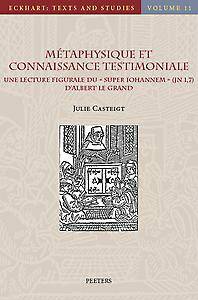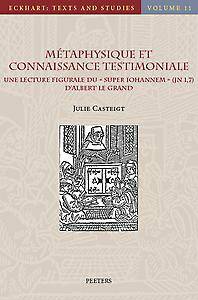
- Retrait gratuit dans votre magasin Club
- 7.000.000 titres dans notre catalogue
- Payer en toute sécurité
- Toujours un magasin près de chez vous
- Retrait gratuit dans votre magasin Club
- 7.000.0000 titres dans notre catalogue
- Payer en toute sécurité
- Toujours un magasin près de chez vous
Métaphysique et connaissance testimoniale
Une lecture figurale du «Super Iohannem» (Jn 1,7) d'Albert le Grand
J. Casteigt
115,00 €
+ 230 points
Description
This essay sheds light on how Albert the Great in his Johannine commentary unfolds his response to various aporia of philosophers on knowing the principle, drawing on John 1:7 ('And, although in itself, it is very manifest, yet our intellect is, in relation to it, like the bat's eyes in relation to the sunlight'). On the basis of the notion of witness, in which he recognizes the very structure of the Gospel of John, the Master of Cologne develops testimonial knowledge as a way to the principle, an alternative to metaphysics. From the noetic point of view, this essay asks how Albert of Cologne redefines the notion of mediation at work in the peripatetic model according to physical, mathematical and metaphysical sciences. Albert recognizes in testimonial knowledge and metaphysics the structural homology of manuduction: both begin with the data of the senses and the imagination that lead the intellect 'by the hand' towards the divine principle. How from an anthropological point of view does testimonial knowledge constitute the mode of knowledge of the principle that is adapted to the human intellect as it is joint to the senses and to imagination? Testimonial knowledge differs from metaphysical knowledge insofar as it is addressed to the human intellect. It remains in the realm of mediation and images. How from a hermeneutical point of view, the Doctor universalis calls intelligentia figuralis the specific method of interpreting images of the principle. Is it an art or a science? By making the notion of testimony a focal point in his reading of the fourth gospel, Master Albert elaborates in a specific way the concept of mediation in the Johannine context. How is this specificity characterized compared to what he develops in his comments on Aristotelian and Dionysian thinking? On the other hand, the Johannine notion of testimony is radically reinterpreted in the light of the vase of light, a Greco-Arabic cosmological theory of mediation. This philosophical essay studies the notion of mediation from a micro-reading of John 1:7, highlighting the textual network to which it belongs, as well as the transversal way in which this notion circulates throughout Albert's work - in the Aristotelian, Dionysian, and scriptural corpus - and in all the fields of his thought - metaphysics, theology, ontology, noesis, physics, cosmology, biology, mineralogy...
Spécifications
Parties prenantes
- Auteur(s) :
- Editeur:
Contenu
- Nombre de pages :
- 665
- Langue:
- Français
- Collection :
- Tome:
- n° 11
Caractéristiques
- EAN:
- 9789042936102
- Date de parution :
- 11-12-19
- Format:
- Livre relié
- Format numérique:
- Genaaid
- Dimensions :
- 168 mm x 246 mm
- Poids :
- 1088 g

Les avis
Nous publions uniquement les avis qui respectent les conditions requises. Consultez nos conditions pour les avis.






